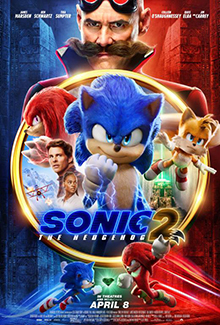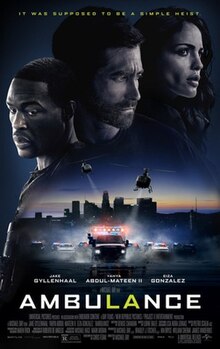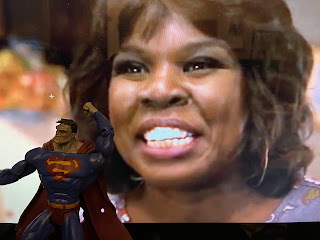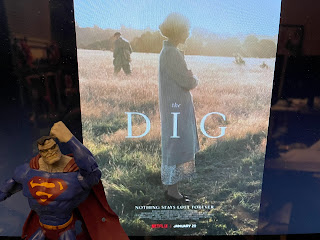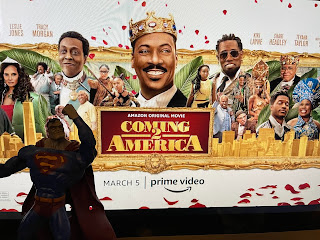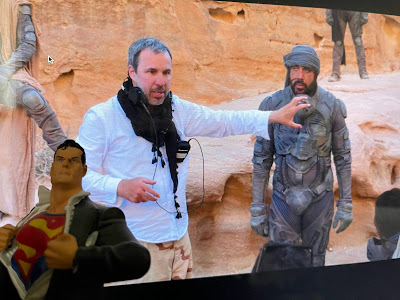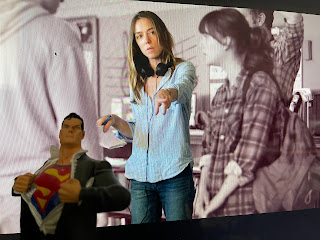With 2021 coming to a close, it is time for us to choose what the best entertainment of the year was. And just as the Academy Awards have their "Oscars", so too the Catholic Skywalker Awards have their "Kal-El's"
I have gone through as many movies as possible this year. There were several that I missed and so was unable to place. Theaters still have not fully recovered and there were a number of films that made their debuts streaming rather than theatrically. For that reason, as I did last year, I have included them in this list.
So of the movies I've seen this year, here are the winners:
(My appreciation and judgment of a film should not be taken as a recommendation. Choosing to watch any of these films is the reader's responsibility)
Also:
MAJOR SPOILERS FOR SPIDER-MAN: NO WAY HOME BELOW.
The winners and their reasons for some of the awards below necessitate revealing things from Spider-Man: No Way Home that are not necessarily common knowledge and were not revealed in any of the advertisements. so be fairly warned:
IF YOU HAVE NOT SEEN SPIDER-MAN: NO WAY HOME AND DO NOT WANT IT TO BE SPOILED, STOP READING THIS ARTICLE NOW.
BEST PICTURE
Spider-Man: No Way Home

If you are surprised by this pick of mine for Best Movie, so am I.
Going into the theater, I thought Spider-Man: No Way Home would be a fun Marvel adventure. On that front, I was not disappointed. But the movie was much better than I had anticipated.
Martin Scorsese criticized super hero movies as something closer to theme park rides than cinema. I understand what he is saying, but I think his point misses out on the magic of the ride. When you are on a thrill-ride, you lose yourself for the briefest of moments and become engrossed in an overwhelming emotion. This is not an easy thing to accomplish in a movie, but No Way Home did that. There were times, even upon multiple viewings, that I was filled with a sense of excitement and happiness.
But it isn't just hollow spectacle. The movie is actually trying to say something. As I wrote in my review:
Also from my review: "The movie also deals with the question of heroes and villains in a way I don't think I've seen handled well enough in most movies. Peter is young and optimistic enough to believe that villains can be redeemed. Is he right?
That is the question at the heart of this movie. It reminds of the feeling I had when I first saw Return of the Jedi when I realized that Luke was a greater hero than I ever imagined because instead he chose redemption of Vader over revenge on Vader.
There is something incredibly Christ-like at the center of that question. Peter is told at one point that the deaths of these villains are a small price to pay for the greater good. But Peter, being innocent and uncorrupted by cynicism, sees each of these villains as persons. We are called by Christ to look at each person as made in the Image and Likeness of God. This is a dangerous thing. While amazing good can come from this, people can still make evil choices. Christ was merciful and He was crucified for it. Peter is merciful. And there is a cost."
Usually at this point, most creators would take the heroic figure and try to deconstruct him (as they did with Luke Skywalker in the Sequel Trilogy). But instead, the makers of No Way Home decided to multiply the heroism and push him even further. While young in the MCU, the story shows that Peter is the hero among heroes. There is a reason that Spider-Man is the THE flagship Marvel character. This movie shows you why.
All of these themes are explored while engaging in a finely plotted film. This is a coming of age story for the MCU. The trappings of childhood from the earlier part of the trilogy are left behind as Peter grows into a man.
I will speak about the performances more later, but they also meet the level of ambition that this movie has. Of all the Spider-Man films mad so far, this is best. And it is also the best film of the year.
RUNNERS UP
CODA
Dune
Zach Snyder's Justice League
Those Who Wish Me Dead
BEST DIRECTOR
Denis Villeneuve - DuneI have had my eye on Villeneuve ever since I was blown away by Arrival. This was a director who knew how to handle high concept science fiction in a way that did not feel cheap or dumbed-down. Dune shows that Villeneuve knows the importance of visual spectacle, but in a way that makes the world of Dune feel more real and not less real. In my original review, I compared him to Peter Jackson on The Lord of the Rings and I stand by that. Jackson grounded Middle-Earth in such a concrete reality that the emotional realism came ringing through the fantastic elements. The same is true for Villeneuve's Dune. His ships, costumes, creatures, and cultures are all things that I have never seen before but carry something eerily familiar, the way all good fantasy should feel.
All the while, Villeneuve uses all of this to tell a complex and engaging story with rich performances. Dune is a notoriously difficult book to adapt, but Villeneuve made something quite beautiful .
RUNNERS UP
John Krasinski - A Quiet Place Part II
Zack Snyder - Zack Snyder's Justice League
Sian Heder - CODA
Jon Watts - Spider-Man: No Way Home
BEST ACTOR
Tom Holland - Spider-Man: No Way Home
I really think that this will be one of the most overlooked performances of the year. Holland's youth play against him as well has his ability to play decency and goodness the way he does. Recognition tends to go to dark and villainous actor portrayals. There is an innocence to his Peter Parker that can be mistaken a naiveté. But Holland takes you on a complete emotional journey. The first half of the film shows us pretty much the same Peter we've known and loved for the last few years. But in the second half, Holland shows us what he's made of.
He not only has to show you his heroic resolution, but he has to show you this while covering it in a veil of youth and inexperience. When he finally has to stand up to Dr. Strange, Holland shows you the internal agony without being too showy.
And when the time comes for overwhelming emotion, Holland knows when to show restraint and when to let go. The look of shock in his eyes has he stands hopeless in the rain is stunning. But when he finds safety with his best friends, he lets himself be a broken child.
In the last few minutes of the movie, Holland stands differently than before. He his still has his youthfulness, but there is a quiet maturity present in his performance that so difficult to capture.
Holland had to hold the emotional center of this epic and he did so amazingly.
RUNNERS UP
Timothee Chalamet - Dune
Bob Odenkirk - Nobody
Denzel Washington - The Little Things
Will Smith - King Richard
BEST ACTRESS
Emelia Jones - CODA
Emilia Jones is utterly fantastic. As emotional as it is, she knows how to pull her feelings in reserve. She feels like the average teenager going through deep internal struggles. You always get the sense that she can never be truly herself either at home or in public and that she always has to play a part. Normally if a movie has a conflict between a teenagers artistic dreams and responsibilities to the family, I am very critical of the teenager (see my review of Blinded by the Light). But Jones makes me feel her frustration and the need to break away.
Jones allows for the emotional build up of her character to come forward at just the right time. And all the while she lets us see the wonderful contradictions of her feelings towards all of the different characters. When interacting with her parents, she feels a million different things at once, from pride to embarrassment, from love to frustration, and everything in between. And all the while she is trying to hold all of her emotions in check so that she can be the door to the outside world for the family she loves. This is a fantastic performance from a young actress that should hopefully get more recognition in the years to come.
RUNNERS UP
Kristen Bell - Queenpins
Emily Blunt - A Quiet Place Part II
Angelina Jolie - Those Who Wish Me Dead
Kaitlyn Dever - Dear Evan Hansen
BEST SUPPORTING ACTOR
Andrew Garfield - Spider-Man: No Way Home
Of the many unexpected things from
Spider-Man: No Way Home, I did not expect the impact that Andrew Garfield would have on the story and the emotion of the film. Sharing 30 minutes of screen time with Tobey Maguire, Garfield used every second to stick the landing on his version of the character.
Garfield's Peter sets himself in complete distinction from the other two with his overly emotional take on the character. His Peter feels things more deeply and is more open about his emotions in a way that the other two are not. He performs the role that a supporting actor should: he enlivens the whole movie while highlighting everything great about the main character.
At the same time, Garfield uses every ounce of his charm and humor to win us over. When he gets hit in the chest with some bread, the way he tilts his head and shrugs his shoulders endears you to him completely. It makes complete sense that of the three Peters, he would blurt out "I love you guys!" at the most seemingly inappropriate time.
But the greatest moment is when Garfield's Peter is able to have his redemption moment. He has only seconds to convey all of the feelings he has and he is able to do it a completely believable way.
If this is end of Garfield's time as Spider-Man, he will be remembered fondly for the way he stuck the landing.
RUNNERS UP
Vince Vaughn - Queenpins
Jon Bernthal - Those Who Wish Me Dead
Oscar Isaac - Dune
JK Simmons - The Tomorrow War
BEST SUPPORTING ACTRESS
Rebecca Ferguson - Dune
The character of Lady Jessica is incredibly difficult to play. She is a woman torn between several worlds and there are thousands of ways for her to react to any given situation that could be the best. Ferguson chooses the best path, which is to show you both the outer strength of the character and her internal vulnerability.
Jessica has to be strong for her son and husband, but her divided loyalties to the Bene Gesserit are constantly at war with her heart. This causes her intense fear that Ferguson constantly shows us Jessica controlling. Rather than play her as an unfeeling robot, Ferguson's Jessica is woman who uses ever ounce of her will power to hold her fear in check in order to giver her family a fighting chance. All the while, she carries a regal, noble posture in her body language in an incredibly effective way.
RUNNERS UP
Amy Adams - Dear Evan Hansen
Marlee Matlin - CODA
Millicent Simmons - A Quiet Place Part II
Marisa Tomei - Spider-Man: No Way Home
BEST SCREENPLAY
Sian Heder – CODA
While this movie is an adaptation of a foreign film, Heder does an excellent job of adapting to an American audience. I like the fact that she knows when to give and withhold the sentiment. Her Mr. Villalobos could have come off as too strict or too saintly. But he has just the right balance of believability. She also handles the antagonistic forces in Ruby's life in a very balanced way. With the exception of some "mean girls" at school, all of the main obstacles that Ruby has to deal with are also sources of love and affection. She writes Ruby as a girl drowning because she is attached to anchors that love her. This gives her story so much more humanity than many movies out there today.
RUNNERS UP
Dune
Spider-Man: No Way home
Those Who Wish Me Dead
BEST MAKEUP
Dune

Unlike the original version from the 1980's the makeup here is not done to distract, but instead to enhance the reality of this fantastical world.
RUNNERS-UP
Spider-Man: No Way Home
The Suicide Squad
BEST SPECIAL EFFECTS
There were a lot of movies with amazing special effects this year. But the movie that used them the best was Dune. The effects brought a concrete reality to a world an alien and fantastic world and thus made it easier to emotionally invest in the story.
RUNNERS-UP
Spider-Man: No Way Home
The Suicide Squad
BEST SCORE
Hans Zimmer - Dune
I loved the haunting score that Zimmer composed for this movie that made something set in the far future feel ancient and timeless.
RUNNERS-UP
Spider-Man: No Way home
CODA
BEST COSTUMES
Dune
There are a lot of things that could look silly in Dune, which did look silly in the original version. But the costumes here feel very lived-in and authentic to each culture that you encounter.
RUNNERS-UP
Spider-Man: No Way Home
Free Guy
BEST SONG
"You Will Be Found" - Dear Evan Hansen
This song is the emotional heart of the movie. It is sad and powerful and uplifting. This is the moment that Evan "goes viral," and you could understand why. My wife said that she wished the movie had ended here on a positive high-note. It is a real show-stopper.
Below are the list of all the films of 2021 that I have seen, ranked in order of excellence:
| Spider-Man: No Way Home |
| Dune |
| Zack Snyder's Justice League |
| Coda |
| Those Who Wish Me Dead |
| Dear Evan Hansen |
| Nobody |
| Ghostbusters Afterlife |
| A Quiet Place Part II |
| The Tomorrow War |
| 8-Bit Christmas |
| American Underdog |
| King richard |
| A Week Away |
| Queenpins |
| Shang-Chi and the Legend of the Ten Rings |
| Black Widow |
| Free Guy |
| Red Notice |
| Luca |
| Godzilla vs. Kong |
| No Time to Die |
| The Little Things |
| The Starling |
| Fatherhood |
| Mortal Kombat |
| Coming 2 America |
| Army of the Dead |
| The Trial of the Chicago 7 |
| Tick, Tick, Boom |
| Gunpowder Milkshake |
| The Woman in the Window |
| The Dig |
| The Suicide Squad |
So that is my list and the conclusion of this year's Catholic Skywalker Awards.
Thoughts?


















